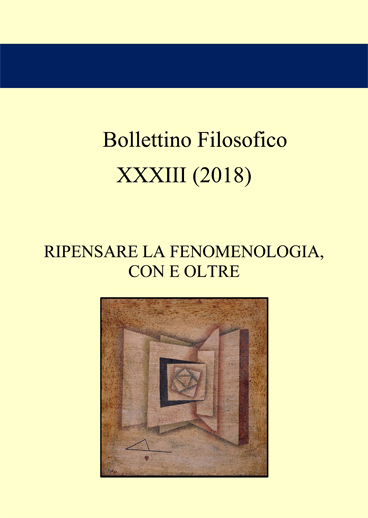Patočka y Henry. A-subjetividad y Fenomenología material: dos modalidades de realismo fenomenológico
DOI:
https://doi.org/10.6093/1593-7178/5944Parole chiave:
Phenomenology, A-Subjective Phenomenology, Husserl, PatočkaAbstract
As is well-known, the Czech philosopher Jan Patočka is one of the most important and sharp continuers of Husserl phenomenology: in an inevitable critical relationship he aims at overcoming Husserl’s perspective, always accurately taking into account the Master’s thought. Patočka has always focalized his attention on the so to say objective aspect of Husserl’s phenomenology. However, he presents an interesting explanation of the subjective one through a reformulation of the phenomenological project in the moment of its foundation in Logical Investigations. It has caused several misunderstandings, thus Patočka’s phenomenology has been defined an “asubjective phenomenology”, leading to the inclusion of Patočka among the so-called “realist phenomenology” of the Göttingen Circle. This is totally incorrect, as we can see in several passages, in which Patočka interprets and comments Husserl’s phenomenology. The article only examines some considerations in Plato and Europe and in Patočka’s Introduction to Husserl’s Phenomenology. Patočka’s criticism to Husserl allows at the same time to clarify the transcendental considerations expressed in the first paragraphs of Ideas I, that converge in the core of the conclusions of the point 55 of the work. Here we can see that Husserl’s supposed “transcendental idealism” is not a return to a form of German classical idealism, but it is rather a peculiar form of “realism” different from the way it has interpreted by the first followers of Husserl.
Downloads
##submission.downloads##
Pubblicato
Come citare
Fascicolo
Sezione
Licenza
Bollettino Filosofico pubblica in internet, ad accesso aperto, con licenza:
| CCPL Creative Commons Attribution |
L'autore conserva il copyright sul suo contributo, consentendo tuttavia a chiunque "di riprodurre, distribuire, comunicare al pubblico, esporre in pubblico, rappresentare, eseguire e recitare l'opera", purché siano correttamente citati l'autore e il titolo della rivista. L’autore, al momento della proposta di pubblicazione, è inoltre tenuto a dichiarare che il contenuto e l’organizzazione dell’opera è originale e non compromette in alcun modo i diritti di terzi, né gli obblighi connessi alla salvaguardia di diritti morali ed economici di altri autori o di altri aventi diritto, sia per testi, immagini, foto, tabelle, sia per altre parti di cui il contributo può essere composto. L’autore dichiara altresì di essere a conoscenza delle sanzioni previste dal codice penale e dalle leggi speciali per l’ipotesi di falsità in atti ed uso di atti falsi, e che pertanto Bollettino Filosofico è esente da qualsiasi responsabilità di qualsivoglia natura, civile, amministrativa o penale, e sarà dall'autore tenuta indenne da qualsiasi richiesta o rivendicazione da parte di terzi.

